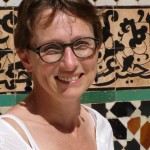The other story
Following our recent trip to Bangui, the capital of the Central African Republic, where we ended up in the middle of a coup d’état, I could write a story about the many horrors of violence and destruction, all in the name of power and greed. I could tell of the fear and anxiety we felt, when the fighting came closer and closer, when the bullets whistled around the house where we were staying. I could tell of the looting that followed the fighting, of the mob that looted the school next to our campus, of the weapons they found and the madness of their celebration, of the voices still unbroken of the young boys in their midst. I could tell you of the boys with guns, who took the director of a Christian NGO, put him against the wall, shot at him … and missed. Boys with guns who play with power! I could tell you of….
On their approach to the city, the rebel soldiers cut the power supply to the city. This meant that after a while, the city was also without water. Living without water in the sticky heat of the end of the dry season is not easy. And so, fairly soon, we saw women with buckets going out to fetch water elsewhere. One of the points of water distribution was the water tower on the campus. In front of it developed a long line of women and girls with buckets and basins in all possible colours. Even though we could still hear guns going off, this line was not a quiet line. The laughter, banter and singing could be heard in our house.
Since we were guests on the campus, several students were worried for us and our ability to cope with the situation. They came and brought us water. At the end of the day, we had so much water that we felt we needed to decline, so that the water could be used by those with babies, who needed the water much more than we did.
These are the stories I want to tell. In the midst of pain, grief, anxiety, violence and injustice in Africa, I have found life and laughter. I have found brothers and sisters who, regardless of the harshness of their daily life experience, hold on to life with a tenacity that I have found nowhere else. And they have accepted us, foreigners, as their guests, with deep generosity and warm hospitality. They allowed us to be part of their community, with a shared vulnerability and with a shared hope. We cried together, we prayed together, we sang together, we laughed together. Together we were living by the grace of God.
A couple of days after the first fighting, I saw the boys on the campus playing football. One of these boys had a leg amputated, just below the knee. Normally, he wears a prosthesis. But, when he needs to go really fast, he leaves his prosthesis behind, picks up his old crutch, and runs. When he kicks the ball, he does it with the crutch. And when he strikes, the field is filled with laughter.
This picture stays with me. The boy will always be living with a handicap. But he is living with such tenacity and creativity, that rather than being defined and victimised by his handicap, he finds his own way of reaching his goal and doing what he loves doing. Maybe his solution is not the solution we would choose. How can a crutch be better than a prosthesis? But this is his solution, which brings him the success he seeks.
This is the other story I want to tell. Yes, there are many problems in Africa, but, without negating those; there is also much life in Africa. This life gives birth to a perseverance and a creativity that finds many different ways of coping and solutions, ways that are often badly understood by those who come from the West.
Where life is fragile and precarious, where anxiety is real, still prayer, song and laughter ring over the field. I am deeply grateful for the privilege of being allowed to be part of such a community, for together learning to live with pain, loss and even injustice in a new way.

